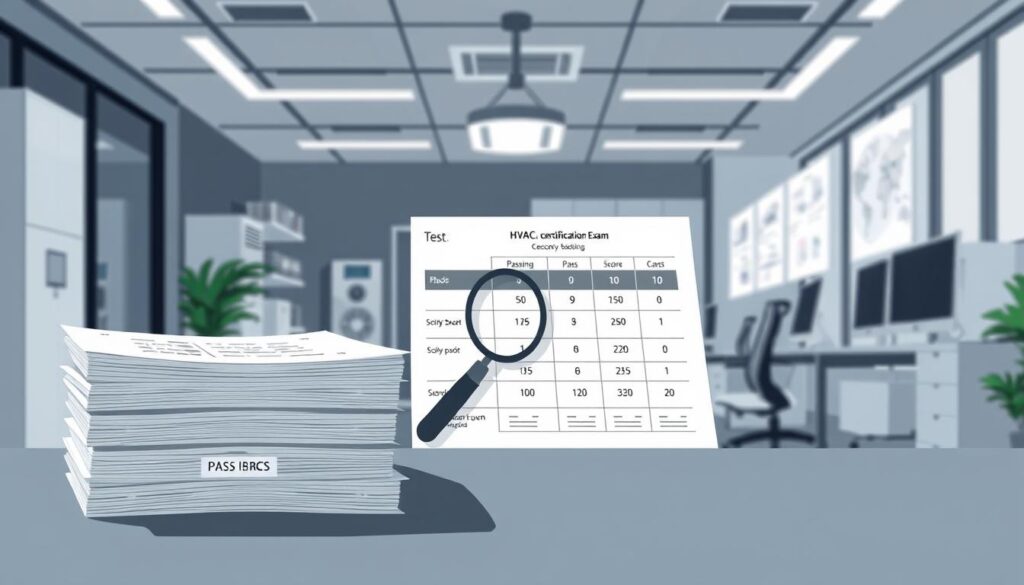Affiliate Disclosure
HVAC Guide Guys is a participant in the Amazon Services LLC Associates Program, an affiliate advertising program designed to provide a means for sites to earn advertising fees by advertising and linking to Amazon.
How Many Questions on HVAC Test? Frank Martinez stood in his garage, surrounded by technical manuals and study guides. He felt overwhelmed by the upcoming HVAC certification exam. Many aspiring technicians wonder about the test’s complexity and structure.

The number of questions on an HVAC certification exam can greatly affect your confidence. Knowing this can help you feel more prepared before the exam.
Understanding the test’s landscape is key when preparing for your HVAC certification exam. Different certification levels have different question counts. Knowing what to expect is the first step to becoming a professional HVAC technician.
The HVAC certification exam varies based on the specific certification type. You’ll usually face between 100 to 120 questions. These questions test your technical knowledge, safety understanding, and practical skills. Each question brings you closer to your goal in the HVAC industry.
Key Takeaways
- HVAC certification exams typically range from 100-120 questions
- Different certification levels have varying test structures
- Exam content covers technical knowledge and practical skills
- Preparation is key to successfully navigating the HVAC certification exam
- Understanding test format helps reduce test-day anxiety
Table of Contents
Understanding HVAC Certification Requirements
Getting into HVAC certification can be tricky. To become a pro HVAC tech, you need to know the key requirements. The hvac certification exam is more than a test. It’s your ticket to being recognized in the HVAC world.
To start in HVAC, you must meet several important standards. These rules make sure you can work safely and well.
EPA Section 608 Certification Basics
The EPA Section 608 Certification is key for HVAC techs. It’s about working with refrigerants and keeping the environment safe. You’ll learn about:
- How to handle refrigerants
- Keeping the environment safe
- Managing equipment safely
State-Specific Requirements
Your hvac license test changes with your state. Each place has its own rules that go beyond federal ones.
| State | Licensing Level | Additional Requirements |
|---|---|---|
| California | C-20 HVAC License | Trade exam, business management test |
| Texas | Class A Certification | Journeyman or Master level examination |
| Florida | Certified Contractor | Business and trade knowledge test |
Different Types of HVAC Licenses
The HVAC world has many certification levels. They match your career goals:
- Registered Technician: For beginners
- Certified Technician: For those who want more
- Contractor License: The top level
Each level of the hvac certification exam brings you closer to being a pro. It opens up more chances in the HVAC field.
Explore Our HVAC Shop
Looking for top-rated HVAC tools, parts, and accessories? Visit our shop and find the perfect solution for your needs.
Visit the ShopTypes of HVAC Tests and Question Formats
When you’re getting ready for your HVAC exam, knowing the different test formats is key. The certification process has many types of tests. They check if you know a lot about HVAC and can do the job well.
To pass your HVAC exam, you need to be familiar with different question types. These tests check your technical skills and how well you can apply what you know. The main question formats you’ll see are:
- Multiple-Choice Questions: These test your knowledge of HVAC theory.
- Practical Application Scenarios: These are problem-solving tests.
- Safety Regulation Evaluations: These check if you follow industry standards.
Each test format has its own purpose. Multiple-choice questions test your knowledge of HVAC theory. Practical scenarios check if you can solve real HVAC problems.
| Question Type | Focus Area | Skills Evaluated |
|---|---|---|
| Multiple-Choice | Theoretical Knowledge | Comprehension of HVAC principles |
| Practical Scenarios | Technical Problem-Solving | Diagnostic and repair skills |
| Safety Assessments | Regulatory Compliance | Industry safety standards |
Passing your HVAC certification exam depends on good preparation. You need to study well for all types of questions. Focus on learning both theory and practical skills, and also on safety rules. This will help you pass the test.
How Many Questions on HVAC Test: A Complete Breakdown
Knowing the structure of HVAC certification tests is key for those entering the heating, ventilation, and air conditioning field. The number of questions on an HVAC test varies by certification level and exam type.
Exploring the number of questions on HVAC tests shows different needs for each certification level. The difficulty level of the test changes with each class, making preparation essential for success.
Class A Certification Test Structure
For Class A certification, candidates face a detailed exam with specific traits:
- Total number of questions: 120
- Covers advanced HVAC systems and complex technical knowledge
- Designed for experienced professionals
Class B Certification Question Count
Class B certification has a different testing experience:
- Total number of questions: 100
- Focuses on intermediate-level HVAC skills
- Suitable for technicians with moderate experience
Practice Test Components
Practice tests are vital for preparing for your HVAC certification. They help you understand the exam format:
| Practice Test Type | Number of Questions | Purpose |
|---|---|---|
| Basic Practice Test | 25-50 questions | Initial skill assessment |
| Comprehensive Practice Test | 75-100 questions | Full exam simulation |
Pro tip: Always check the specific requirements for your state and certification level. HVAC test formats can vary slightly based on local regulations.
Explore Our HVAC Shop
Looking for top-rated HVAC tools, parts, and accessories? Visit our shop and find the perfect solution for your needs.
Visit the ShopHVAC Test Content Areas and Topics
When you’re getting ready for your HVAC test, knowing the main topics is key. The test checks your technical skills and professional knowledge in many areas.
Your HVAC certification exam covers several important topics:
- Technical Systems Knowledge
- Safety Regulations
- Refrigeration Principles
- Electrical Systems
- Heating and Cooling Equipment
The technical knowledge part is the biggest part of the test. You’ll see questions on:
- HVAC system design principles
- Equipment installation techniques
- Maintenance procedures
- Troubleshooting methodologies
“Success in the HVAC exam requires a deep understanding of both theoretical concepts and practical applications.” – HVAC Professional Training Institute
Safety rules are also a big part of your test prep. You’ll face questions on workplace safety, environmental laws, and how to handle refrigerants. Your knowledge of EPA rules and safety practices will be tested.
The practical questions will test your ability to solve real-world problems. These questions mimic the challenges you might face on the job.
Time Allocation and Test Duration
Passing the HVAC exam needs good time management and planning. Knowing the test’s time limits and how to pace yourself is key.
Most HVAC exams last 2-4 hours. The exact time can vary based on the exam’s level and how hard it is. The difficulty of the test affects how you manage your time.
Recommended Pacing Strategies
- Allocate about 1-1.5 minutes for each multiple-choice question
- Go over tough sections during your first pass
- Mark hard questions to review later
- Save 15-20 minutes for checking your answers at the end
“Time management is not about doing everything faster, but doing the right things at the right pace.” – HVAC Certification Expert
Understanding Break Policies
Most exams offer only a few breaks. Knowing these rules helps you stay focused:
| Break Type | Duration | Restrictions |
|---|---|---|
| Scheduled Break | 10-15 minutes | Clock keeps running |
| Unscheduled Break | 5 minutes | Only for emergencies |
Pro tip: Practice staying focused during mock exams. It helps build your mental strength for the real test.
Explore Our HVAC Shop
Looking for top-rated HVAC tools, parts, and accessories? Visit our shop and find the perfect solution for your needs.
Visit the ShopHVAC Test Scoring System and Passing Requirements

Understanding the HVAC exam scoring system is key to passing your HVAC certification exam. The scoring process might seem complex. But, breaking it down helps you focus your study efforts.
Most HVAC certification exams use a standard scoring method. They check your performance in various knowledge areas. You need to score at least 70% to pass.
- Passing score: 70% or higher
- Total possible points: Varies by certification type
- Scoring based on correct answers
Your exam results depend on how many questions you get right. Each question counts the same. There are no partial points or penalties for wrong answers.
| Certification Level | Passing Score | Total Questions |
|---|---|---|
| Type I | 70% | 50-75 questions |
| Type II | 70% | 75-100 questions |
| Universal | 70% | 100-125 questions |
To prepare for your HVAC certification exam, use a thorough study plan. Practice tests can help you grasp the scoring system. They also show you where to improve.
Pro tip: Always aim to score above the minimum 70% to demonstrate strong knowledge and increase your professional credibility.
Preparing for Different Sections of the HVAC Exam
To ace the HVAC exam, you need a solid plan. Your study guides should cover all the bases. The exam checks your technical skills, safety know-how, and how well you apply what you’ve learned.
Good HVAC study guides suggest focusing on specific areas. This method boosts your confidence and helps you conquer each part of the exam step by step.
Technical Knowledge Components
Mastering technical skills is key for your HVAC certification. Your prep should include:
- Refrigeration cycle principles
- Electrical systems and circuits
- Thermodynamics basics
- Equipment troubleshooting methods
Safety Regulations Understanding
Safety is a big deal in HVAC. Make sure you know:
- EPA refrigerant handling rules
- Personal protective equipment needs
- Identifying workplace hazards
- Electrical safety rules
Practical Application Questions
The exam puts your knowledge to the test in real-world situations. Use scenario-based questions to practice. Focus on:
- System design analysis
- Performance calculations
- Diagnostic problem-solving
- Installation best practices
“Preparation is the key to success in your HVAC certification journey.” – HVAC Professional Training Institute
Explore Our HVAC Shop
Looking for top-rated HVAC tools, parts, and accessories? Visit our shop and find the perfect solution for your needs.
Visit the ShopTest Registration Process and Requirements
Getting ready for your HVAC test registration might seem tough. But with the right help, you’ll be ready for your exam. Knowing the steps will make your journey to becoming a certified HVAC pro easier.
Registering for your HVAC certification exam involves a few important steps. You’ll need to gather certain documents and meet specific requirements before you can schedule your test.
- Verify your eligibility for the HVAC certification exam
- Collect necessary educational and professional documents
- Select an approved testing center
- Complete the official registration form
- Pay the required examination fees
When you’re getting ready for your hvac test registration, make sure to check the specific needs for your state. Each area has its own rules for HVAC certification exams. So, it’s important to talk to your local licensing boards.
Most testing services need a few things when you register:
- Proof of completed HVAC training program
- Valid government-issued identification
- Completed application form
- Examination fee payment
You can usually register online through approved testing sites. Pro tip: Book your exam early to get the date and place you want.
Preparation is key to successfully navigating the HVAC certification exam registration process.
Always double-check the requirements and make sure your documents are correct. This will help you have a smooth registration process.
Common Challenges and Test-Taking Strategies

Getting through the HVAC certification exam can be tough. It’s not just about knowing the technical stuff. You also need smart ways to tackle common problems and do well on the test.
It’s key to get good at hvac practice tests. This helps build your confidence and spot areas where you need to improve. The right tactics can make the exam feel less scary.
Time Management Tips for Success
Managing your time well is essential during the HVAC exam. Here are some tips:
- Set aside a certain time for each part of the exam
- Practice reading questions fast and well
- Move on from hard questions and come back later
- Keep an eye on the time with a watch or the exam room clock
“Preparation is the key to conquering any challenging exam.” – HVAC Certification Expert
Question Analysis Techniques
Being good at analyzing questions can really boost your score. Here are some methods to tackle tough questions:
- Read each question carefully
- Spot important technical terms
- Get rid of answers that are clearly wrong
- Use elimination to narrow down choices
- Trust your first instinct
Remember, confidence and smart preparation are your best tools for passing the HVAC certification exam.
Explore Our HVAC Shop
Looking for top-rated HVAC tools, parts, and accessories? Visit our shop and find the perfect solution for your needs.
Visit the ShopState-Specific HVAC Testing Variations
Getting your HVAC certification can be tricky because of big differences in state rules. Your test experience will change based on the state you want to work in. Some places have strict rules, while others are more relaxed.
It’s important to know the local rules for HVAC pros. States like California, Florida, and Texas have tough rules that go beyond national standards. You need to plan your study time based on these local rules.
- California requires extra modules on earthquake and energy efficiency in the test.
- Florida has special rules for wind resistance in HVAC setups.
- Texas has more questions on electrical system integration.
Here are some main differences in state testing:
- Exam Format: You might face multiple-choice or practical skills tests.
- Question Count: Tests can have 80 to 150 questions.
- Time Allocation: Tests last from 2 to 4 hours.
Before you take your test, check your state’s rules. Talk to local licensing boards or HVAC groups for the latest on state standards.
Pro Tip: Never assume national certification automatically qualifies you in every state.
Retesting Policies and Procedures
Going through the retesting process for your HVAC certification exam can be tough. Knowing the rules and steps will make you feel more ready and prepared.
If you don’t pass your first HVAC certification exam, you’ll need to look at the retesting rules closely. Most places let you try again, but each try has its own rules and limits.
- Standard waiting period between exam attempts: 30-90 days
- Full test registration required for each attempt
- Potential additional fees for retaking the exam
- Some testing centers may limit total number of retakes
Your HVAC test registration is only good for a certain time. You can take your retake when it’s allowed by the rules of the certification body. Each place has its own rules, so it’s important to check them out.
| Exam Attempt | Waiting Period | Registration Status |
|---|---|---|
| First Attempt | Initial Test | Full Registration |
| Second Attempt | 30-45 Days | New Registration Required |
| Third Attempt | 60-90 Days | Complete Reregistration |
Pro tip: Use your waiting period to study and improve areas where you previously struggled. Many successful professionals view retakes as an opportunity for deeper learning.
Remember, never give up on getting your HVAC certification. Every try gets you closer to your goal. It also gives you more experience and knowledge about the exam.
Conclusion
Knowing how many questions are on an HVAC test can change your study plan. Success comes from knowing the test structure, question types, and how to study well. The right strategy lets you tackle HVAC certification confidently.
Getting ready for an HVAC exam means planning and knowing a lot of technical stuff. By understanding the exam parts, question types, and study methods, you boost your chances of passing. Each part of the test needs its own skills and knowledge.
Starting your journey to become a certified HVAC pro means being well-prepared. Learn about state rules, focus on technical skills, and work on your test-taking skills. Spend time on practice tests, review important topics, and improve your technical skills to do well in your certification journey.
With hard work and a good learning plan, you can overcome the challenges of HVAC certification exams. Keep motivated, stay focused, and believe in your ability to learn the technical skills needed in this exciting field.

